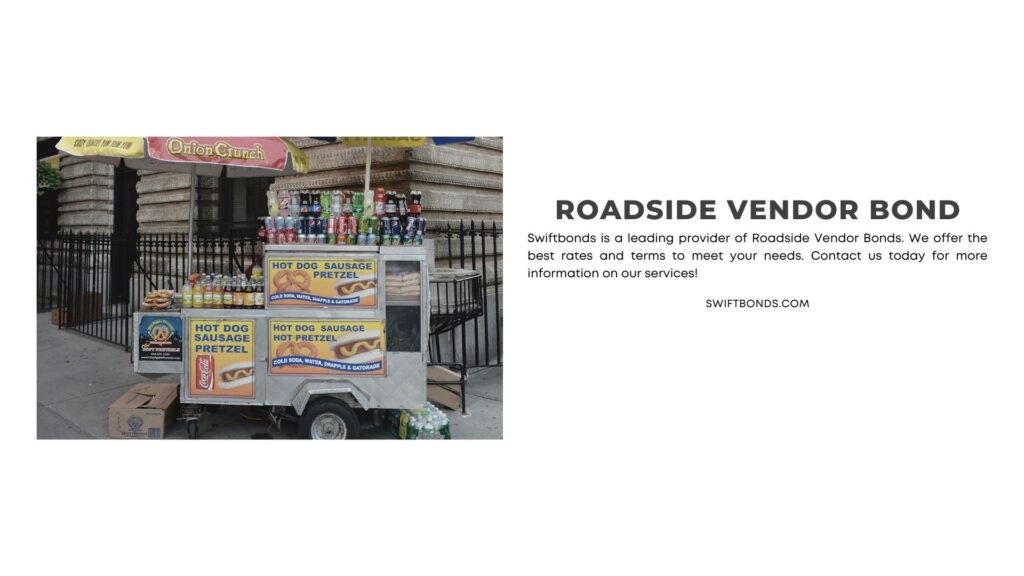What is a Roadside Vendor ($2,000) Bond?
A Roadside Vendor ($2,000) Bond is a type of surety bond required by Palm Beach County for individuals or businesses operating as roadside vendors. This bond serves as a form of protection for consumers and the county government. In essence, it guarantees that the vendor will comply with all relevant laws and regulations governing roadside vending activities.
Get An Instant Quote on Palm Beach County, FL – Roadside Vendor ($2,000) Bond Now
Why is the Bond Required?
The primary purpose of the Roadside Vendor ($2,000) Bond is to safeguard consumers against potential fraud, deception, or non-compliance with local ordinances by roadside vendors. By requiring vendors to obtain this bond, Palm Beach County aims to promote fair and ethical business practices within its jurisdiction.
If you’re looking for an easy way to get your business up and running, we have what it takes to make sure everything goes smoothly. Let us take care of all your bonding needs so that you can focus on what really matters – making money!
Click this right now to apply for your new roadside vendor bond with Swiftbonds!

How Does the Bond Work?
When a roadside vendor obtains a Roadside Vendor ($2,000) Bond, they are essentially entering into a contractual agreement with a surety company. In the event that the vendor violates any laws or regulations related to their vending activities, a consumer or the county government can file a claim against the bond.
If a valid claim is made and proven, the surety company will compensate the affected party up to the bond’s limit, which in this case is $2,000. The vendor is then responsible for reimbursing the surety company for the amount paid out in claims.
Who Needs to Obtain the Bond?
Any individual or business engaging in roadside vending activities within Palm Beach County must obtain the Roadside Vendor ($2,000) Bond as a prerequisite for operating legally. This includes vendors selling goods such as food, beverages, merchandise, or services from temporary or mobile locations along roadsides, public parks, or other designated areas.
How to Obtain the Bond?
To obtain a Roadside Vendor ($2,000) Bond, vendors must first contact a licensed surety company authorized to issue bonds in Florida. The vendor will be required to complete an application and undergo a review process, which may include a credit check and assessment of business credentials.
Once approved, the vendor will need to pay a premium to the surety company, which typically ranges from 1% to 5% of the bond amount ($2,000 in this case). The premium is determined based on factors such as the vendor’s creditworthiness, business history, and the level of risk associated with their vending activities.
Upon payment of the premium, the surety company will issue the bond, which the vendor must then submit to the appropriate authorities in Palm Beach County as proof of compliance with bonding requirements.

Benefits of Obtaining the Bond
Obtaining a Roadside Vendor ($2,000) Bond offers several benefits for roadside vendors operating in Palm Beach County:
- Legal Compliance: By obtaining the bond, vendors demonstrate their commitment to complying with local laws and regulations governing roadside vending activities. This helps avoid potential fines, penalties, or legal consequences for non-compliance.
- Consumer Confidence: The bond provides consumers with reassurance that they are dealing with a legitimate and responsible roadside vendor. This can enhance trust and confidence in the vendor’s products or services, leading to increased sales and customer satisfaction.
- Financial Protection: In the event of a valid claim against the vendor, the bond ensures that affected consumers are promptly compensated for any financial losses incurred. This protects both consumers and the vendor from the financial repercussions of disputes or grievances.
- Competitive Advantage: Operating with a valid Roadside Vendor ($2,000) Bond may give vendors a competitive edge in the marketplace. Consumers are more likely to patronize vendors who demonstrate a commitment to ethical business practices and regulatory compliance.
Conclusion
In summary, the Roadside Vendor ($2,000) Bond is a crucial requirement for individuals and businesses operating as roadside vendors in Palm Beach County, Florida. By obtaining this bond, vendors contribute to consumer protection, regulatory compliance, and the overall integrity of the roadside vending industry. Understanding the purpose and benefits of the bond is essential for vendors seeking to establish a reputable and successful presence in the vibrant marketplace of Palm Beach County.
Frequently Asked Questions
Can a Roadside Vendor Bond be transferred between vendors?
No, a Roadside Vendor Bond cannot be transferred between vendors. Each vendor is required to obtain their own bond to operate legally within Palm Beach County. If a vendor sells their business or ceases operations, the bond associated with that business becomes invalid, and the new owner or a new vendor must obtain a new bond to continue roadside vending activities.
Are there any exemptions from the requirement to obtain a Roadside Vendor Bond?
Yes, there are exemptions from the requirement to obtain a Roadside Vendor Bond in Palm Beach County, FL. Vendors participating in certain events or activities authorized by the county may be exempt from bonding requirements. However, exemptions are granted on a case-by-case basis and typically require approval from the relevant county authorities.
What happens if a vendor fails to renew their Roadside Vendor Bond?
If a vendor fails to renew their Roadside Vendor Bond before it expires, they may be subject to penalties, fines, or enforcement actions by Palm Beach County authorities. Operating without a valid bond is a violation of local ordinances and may result in the suspension or revocation of the vendor’s license to operate. Additionally, the vendor may be liable for any damages or losses incurred by consumers due to their non-compliance with bonding requirements. It is essential for vendors to stay informed about bond renewal deadlines and ensure timely renewal to avoid disruptions to their roadside vending activities.

